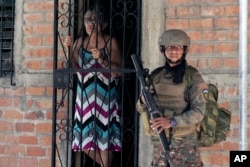Salvadoran President Nayib Bukele cares little for journalists or the free press, his critics say. He rarely gives briefings and prefers to communicate via Twitter.
But while he doesn’t mind being questioned too much about his policies, analysts say Bukele criticizes media outlets that report critically on him and his government.
Respected news websites such as El Faro and Revista Factum, which specialize in reporting on corruption, are among those targeted with accusations ranging from money laundering to false reporting.
During his time in office, the Bukele Administration is alleged to have created what a news agency investigative article Reuters He described it as a “communications giant” made up of “paid internet trolls” who attack the media and opposition voices.
Thirty-five Salvadoran reporters and civil rights activistshave been attacked by Pegasus softwareaccording to the Citizen Lab at the University of Toronto, which investigates digital surveillance of civil society.
Developed by the Israeli company NSO, the software Pegasus is marketed to government agencies and can be used to extract data from mobile phones or activate cameras and microphones.
The Salvadoran embassy in Madrid did not respond to an email requesting comment from the voice of america.
Salvadoran authorities have previously denied using Pegasus to hack phones. However, the officials did not respond to Reuters requests for comment on their November 2022 investigation into government troll factories.
Analysts have warned that the hostile relationship between the press and the president could pose a threat to independent media, especially during elections.
Bukele, who was elected president in 2019, last year announced plans to run for re-election in 2024.
The announcement came after the country’s highest court overturned a ban on leaders seeking two consecutive terms.
Along with surveillance and verbal abuse for critical coverage, threats of death or sexual violence are all too common a danger for independent journalists in El Salvador.
Reporters in this small Central American nation say the state is adding to this atmosphere of threat rather than offering any protection.
“These threats match the government narrative. Instead of protecting you, the government encourages these threats,” says José Luis Sanz, a correspondent for The lighthouse in washington.
Sanz told the VOA who believes that state departments, including the tax office, were used to fabricate false charges of money laundering and to intimidate advertisers for his news outlet. In 2020, Bukele claimed at a press conference that The lighthouse was linked to money laundering, Sanz replied that it is a falsehood.
“Freedom of the press exists but it is threatened. We have received threats from different governments over the years,” said Sanz. But “the level of stigmatization, criminalization, and attacks on independent journalists by the current government—and the investment in harassing and spying on journalists—has gone much further.”
Sanz was among about 20 El Faro journalists whose cell phone messages were intercepted using Pegasus.
During the infiltration period, El Faro was working on stories about Bukele’s alleged dealings with gangs to reduce the homicide rate, at the convenience of the president.
Sanz admits that there was no evidence that the government was behind the surveillance, but points out that the software de Pegasus is sold only to governments.
attack mode
For some journalists, harassment and threats force them to leave.
Among them is Héctor Silva Ávalos, who left El Salvador 18 months ago and since then has sought asylum in the US with his wife and three children.
He now works for the news websites Infobae, from Argentina, and Prensa Comunitaria, from Guatemala.
“Bukele’s popularity is based on the narrative that does not admit criticism. That is why he attacks the independent press, ”Ávalos told the VOA. “I suffered a campaign of harassment towards me and my family. The tax office or the police came to my house or that of my relatives. They were asking what kind of vehicles we had and making other threats.”
Bukele may not be popular with journalists, but he is with the majority of El Salvador’s 6.5 million people, according to a CID Gallup poll of July. The survey found that 86% supported the president while 14% disapproved.
The president’s handling of the pandemic and his decision to jail some 50,000 members of criminal gangs slashed El Salvador’s homicide rate to one of the lowest in the Americas.
In 2022, the homicide rate was eight per 100,000 inhabitants compared to 105 in 2015, according to government figures.
Journalists who try to dig into government policy or decisions say instead they face backlash.
In December 2022, Bukele attacked the opposition newspaper La Prensa Gráfica when it questioned the legality of his re-election.
The cryptocurrency issue
Bitcoin is another hot topic. In 2021, El Salvador became the first country to adopt bitcoin as legal tender.
Analysts quoted in the media have said that the president’s intimidation of the press has prevented proper scrutiny of his use of the country’s money to speculate in cryptocurrencies.
Financial media reported last year that credit ratings agency Moody’s had estimated that Bukele’s bitcoin plan resulted in losses of $57 million.
When The New York Times reported on El Salvador’s Bitcoin experiment and predicted that the country would default on loans, Bukele went on the offensive.
“The full page is spread in the New York Times and all that, creating the narrative that El Salvador was bankrupt. I called them at the time but of course who would believe us and not all the international media and their ‘economic geniuses’?” he tweeted in January.
Michael Shifter, an adjunct professor of Latin American studies at Georgetown University in Washington, said Bukele’s campaign against the media had damaged a fundamental pillar of democracy: a free press.
“Relentless criticism by the media has instilled a climate of fear, leading to self-censorship and reporting on narrow and nondescript topics,” he told the VOA. “Bukele’s war against the independent press may work well politically, but it is damaging a system that is based on checks and balances.”
In Latin America, the Salvadoran president is far from unique in terms of hostility towards the press.
Nicaraguan President Daniel Ortega, former Brazilian President Jair Bolsonaro, and Guatemalan President Alejandro Giammattei have all been criticized for their approach to the media.
Last week, Ortega expelled 222 opponents – civil rights activists, political leaders, priests and journalists – jailed and stripped of their citizenship.
Connect with the Voice of America! Subscribe to our channel Youtube and activate notifications, or follow us on social networks: Facebook, Twitter and instagram.















